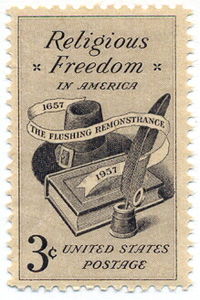Running for the Republican presidential nomination three years ago, Newt Gingrich called the Affordable Care Act’s contraception mandate “the most outrageous assault on religious freedom in American history,” adding, “Every time you turn around the secular government is shrinking the rights of religious institutions in America.”
As Supreme Court prepares to hear oral arguments tomorrow on whether there is a constitutional right to same-sex marriage, this claim of unprecedented assault on religion in America has become GOP boilerplate.
Writing in the New York Times last week, Louisiana governor Bobby Jindal put it this way:
Our country was founded on the principle of religious liberty, enshrined in the Bill of Rights. Why shouldn’t an individual or business have the right to cite, in a court proceeding, religious liberty as a reason for not participating in a same-sex marriage ceremony that violates a sincerely held religious belief?
On Saturday, Sen. Ted Cruz (R-TX) denounced “a liberal fascism that is going after Christian believers” in a speech to the Iowa Faith and Freedom Coalition. “Today’s Democratic Party has become so radicalized for legalizing gay marriage in all 50 states that there is no longer any room for religious liberty,” he said.
The GOP would do well to bone up on its history. And I’m not only referring to laws directed against Catholics and Mormons in the later 19th century. From the beginning of the Republic, the disestablishment of religion led to legal regimes throughout the country that involved a high degree of government control over what religious bodies could do.
In an examination of laws and court decisions largely overlooked by other scholars, University of Pennsylvania law professor Sarah Barringer Gordon has discovered up to the Civil War states used their incorporation statutes to strictly limit how much property religious institutions could own. In the South, courts stepped in to prevent anti-slavery churches from buying slaves in order to free them.
States also set up trustee governance that took control out of the hands of the clergy. “By passing general incorporation statutes for religious societies, states forcibly democratized and laicized church governance,” Gordon wrote in a University of Pennsylvania Law Review article last year. That went even for strictly hierarchical bodies like the Catholic Church.
In more recent times, courts and legislatures have taken a dim view of the assertion of religious rights that directly affect the conduct of citizens outside the faith community — such as claims for exemption from the ACA’s contraception mandate or from anti-discrimination laws when asked to provide goods or services for same-sex weddings. Discussing these “complicity-based conscience claims” in a recent Yale Law Journal article, Douglas NeJaime and Reva Segal, law professors at U.C. Irvine and Yale respectively, point out: “In adjudicated religious liberties law, when accommodation has threatened to impose significant burdens on other citizens, courts have repeatedly rejected the exemption claims.”
What we are seeing in Republican culture war rhetoric is a spiritual libertarianism that asserts a general right to ignore laws that one objects to on religious grounds, no matter what the effect on others. This not only ignores the actual history of law governing religion in America but it’s asking for trouble.






